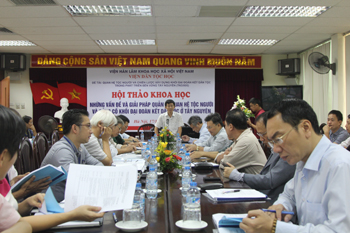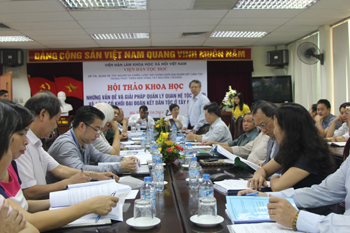The conference attracted many participants from institutes of VASS including Institute for Southeast Asian Studies, Institute of Social Sciences of Central Highlands, Institute of Culture Studies, Institute of Sociology; representatives of Dak Lak Committee of Ethnic minorities and some institutions of universities, departments, other offices in Hanoi.

|
|

|
|
Assoc. Prof. Dr. Vuong Xuan Tinh, Director of Institute of Anthropology was having an openning speech at the conference |
|
Assoc. Prof.Dr. Pham Quang Hoan, a chairman of the project TN3/X05 was presenting a report of Background at the conference |
The conference focussed on three major contents as following: 1. Characteristics of ehtnic minorities in the Central Highlands; 2. Issues of relations between ethnic minorities and great unity in the Central Highlands, and their effects on sustainable development in the Central Highlands; 3. Standpoints system and solutions to development of ethnic minorities and administration of relations betwwen ethinic minorities, consolidation of great unity in sustainalbe development in the Central Highlands.
In the opening speech, Assoc. Prof. Dr. Vuong Xuan Tinh, Director of Institute of Anthropology warmly welcomed attendence of all participants and believed that there would be many debates on the issues of the project TN3/X05 at the conference. As the result of that, the prroject has more theorical foundations in order to gain effectively purposes of the research.
In a report of Background on some issues of relations between ethnic minorities and great unity in the Central Highlands in condition of development, integration and globalization, Assoc. Prof. Dr. Pham Quan Hoan suggested some important ideas of role of ethnic minority relations in sustainable development in the Central Highlands as following: (1) Ethnic minority relations and great unity express in a number of areas, dimensions, angles those connect to liveliness, sustainability and non-sustainability, development and non-development of each ethnic minority, each local, region and nation; (2) Sustainability and sustainable development in the Central Highlands in terms of politics, economy, society, culture and environment are influenced by ethnicity, ethnic minority relations and great unity; (3) Good ethnic minority relations and steadily consolidated great unity will generate sustainability and development of economy, culture, society among ethnic minorites, population groups in whole as well as strengthening adhesion in community, retaining control of politics, society and a whole country; (4). Trend of disagreement, conflict, contradiction, division in ethnic minority relations and great unity will affect negatively development of the Central Highlands and Vietnam.
Mr. Pham Quang Hoan also highlighted some characteristics of ethnic minorities in the Central Highlands in terms of three dimensions: First, increase of ethnic minority components and living alternately among ethnic minorities cause increase of access, transform cultural life of ethnic minorities, as well as generating advantages and challenges. Second, diverse cultures and religions have transformed strongly, from traditional religious beliefs into other religions and “strange belief”. New community of ethnicity-religion is established. Third, there is strong movement and transformation of population in the area, interarea and interborder. Significantly, there is uncontrollable movement of H’mong people and foreign workforce in the Central Highlands.
On basic of analysis of ethnic minority relations and great unity in association with sustainable development in the Central Highlands, Mr. Pham Quang Hoan, chairman of the project provided six following relations: relations between ethnic minorities and nation; relations between ethnic minorities and Kinh people; relations between original ethnic minorities and immigrated ethnic minorities; relations within ethnic minority; inter-ethnic minority relations; and relations between Christian and traditional religious belief communities, relations between ethnic minorities and foreigners. He emphasized: main trend throughout ethnic minority relations and great unity is equality, solidarity, cooperation, confidence, tight relations, support each other for develoment together.; Development of national and ethnic awareness is needed, via national icons, political system, policy, unity of language; Economic-social development needs to rely on both benefit of the nation and ethnic minorities; Increase of relations between original ethnic minorities and Kinh people, immigranted ethnic minorities in terms of all living issues: economy, culture, society, mariage, etc.
Mr. Pham Quang Hoan also analyzed unexpected issues within ethnic minority relations and great unity in the Central Highlands in five following aspects: (1) Distinctive living level and property use among ethnic minorities; (2) Some ethnic minority conflict in connection to property, economy, culture, etc.; (3) Cracked traditional ethnic minority culture; (4) Uncontrollable religious organizations’ activities affect ethnic minority relations and great unity; (5) International relations and solidarity of religion and ethnic minority are used by rivals.
On the basic of mentioned issues, Assoc. Prof. Dr. Pham Quang Hoan also highlighted strongly some key concepts and solutions in effective administration of ethnic minority relations and great unity. Those are: First, the concepts that araising awareness, reniewing thought, specification, multi-policies; combining tightly regional development with ethnic minority development; combining resonably economic-social development with environment protect and defence security, between national and ethnic minority benefits; preservation, enrichment, promotion of traditional culture values toward sustainable development, national culture development, development and enrichment of ethnic minority characteristics. Second, the solutions are to strengthen ethnic minorities in relationship to the nation; promote economic-social development; renew ethnic policies; renew administration of ethnic minority relations and religions; focus on training and developing officials of ethinic minorities (in particular original ethnic people)…
In addition to the report mentioned above, there are also other reports that are relevance to the theme of the conference, such as: Evaluation of ethnic policies in relation to stability and sustainable development of ethnic minorities, solutions of developing strategy of great unity consolidation in sustainable development in Dak Lak province (presented by Mr. Y Ring Adrong, Chairman of Committee of Ethnic minorities); Relations among ethnic minorities in the Central Highlands (by Dr. Ly Hanh Son, Institute of Anthropology); International cooperation of economy-society in the Central Highlands: emergent issues (Assoc. Prof. Dr. Nguyen Duy Dung, Institute for Southeast Asian Studies); Factors affect ethnic minority relations and great unity in the Central Highlands (Assoc. Prof. Dr. Bui Van Dao, Institute of Social Sciences of Central Highlands); Property and ethnic minority relations in the Central Highlands (Dr. Tran Hong Hanh, Institute of Anthropology); Review of implementation of ethnic policies in the Central Highlands in the strategy of great unity (Assoc. Prof. Dr. Nguyen Ngoc Thanh, Institute of Anthropology); Facts of great unity within ethnic minorities in the Central Highlands since the renovation (Dr. Dang Thi Hoa, Institute for Family and Gender Studies); Impact of religion, religious belief on ethnic minority relations in the Central Highlands (Assoc. Prof. Dr. Nguyen Van Minh, Institute of Anthropology); Traditional culture in the Central Highlands in relations to role of consolidation of great unity within ethnic minorities (Assoc. Prof. Dr. Do Hong Ky, Institute of Social Sciences of Central Highlands).
In the conclusion and evaluation of the conference, Assoc. Prof. Dr. Pham Quang Hoan, Chairman of the project TN3/X05 expressed his gratitude to participants with presentations and useful debate at the conference and confirmed that those meaningful ideas contribute to the success of the project, in particular the project is in process of finish and correction for approval in the near future.
Pham Vinh Ha







